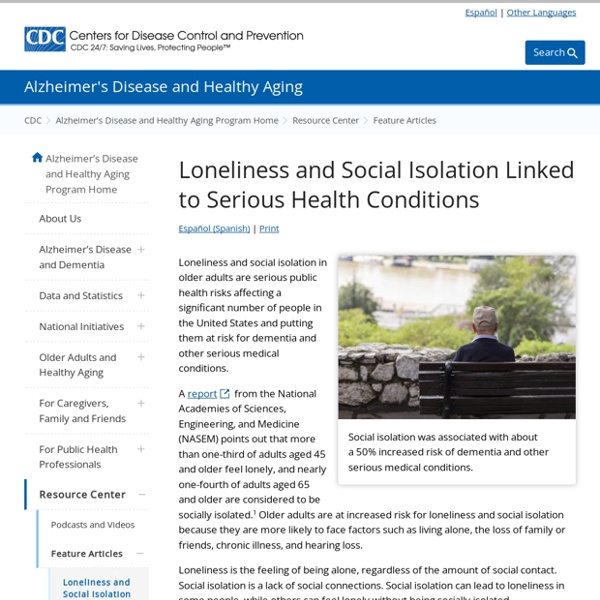9 Coping Strategies for Caregivers of Seniors - My Mental Health
Supporting Seniors & Elderly 9 Coping Strategies for Caregivers of Seniors 1 July 2020 | 8 min read Caregiving can be both rewarding and challenging.
The consequences of socially isolating seniors - TMC News
As social creatures, humans are naturally hardwired to seek companionship and social connection, but COVID-19 is forcing people to adapt to a new reality anchored by social distancing and isolation. :::::::::::::::::::::::::::::::::::::::::::::::::::::::::::::::::::::::::::::::::::::::::::::::::::::::::::::::::::::::::::::::::::::::::::::::::::::: Looking for the latest on the CORONAVIRUS? Read our daily updates HERE. ::::::::::::::::::::::::::::::::::::::::::::::::::::::::::::::::::::::::::::::::::::::::::::::::::::::::::::::::::::::::::::::::::::::::::::::::::::::
The unspoken COVID-19 toll on the elderly: Loneliness
Mary Faines just turned 94 years old. For years the tradition has been to celebrate her special day with a festive dinner with her husband, son and daughter-in-law. It took a pandemic to break the long-standing tradition. “This year was the first time we don't go out and celebrate with a dinner party. That has always been a big treat,” Faines told ABC News. The implementation of physical distancing is an essential step in reducing transmission of the virus.
The loneliness of social isolation can affect your brain and raise dementia risk in older adults
Physical pain is unpleasant, yet it’s vital for survival because it’s a warning that your body is in danger. It tells you to take your hand off a hot burner or to see a doctor about discomfort in your chest. Pain reminds us all that we need to take care of ourselves. Feeling lonely is the social equivalent to feeling physical pain.
Family Caregiver Guide: Caring for a Senior At Home
Custom Search Family Caregiver Guide: Caring for a Senior At Home
Information for Older Adults and Caregivers During the COVID-19 Pandemic
Experts here at U-M have put together some suggestions to help you and your loved ones stay safe during the COVID-19 pandemic. People who are 65 years of age or older are especially encouraged to practice social distancing during this time due to their increased risk of severe illness. Stay home. Stay safe.
The effects of isolation on the physical and mental health of older adults
With the world in the grip of the covid-19 pandemic, unprecedented restrictions have been placed on social freedoms. The UK government has asked those aged 70 years and older to follow strict social distancing measures to reduce the transmission of, and susceptibility to, covid-19. These restrictions involve: reducing social mixing in the community, not having friends and family visiting the house, and minimising the use of public transport. Moreover, individuals with certain high-risk conditions are advised to not leave the home at all. [1] While undoubtedly vital to reduce the impact of covid-19 on this vulnerable group, which is more susceptible to severe disease, these interventions carry risk, particularly on physical activity profiles and on mental health. How can we mitigate this?
Social isolation and loneliness among older adults in the context of COVID-19: a global challenge
Social isolation is defined as the objective state of having few social relationships or infrequent social contact with others while loneliness is a subjective feeling of being isolated. Social isolation and loneliness are serious yet underestimated public health risks that affect a significant portion of the older adult population. In the U.S., approximately one-quarter of community-dwelling older adults are considered to be socially isolated, and 43% of them report feeling lonely [2]. The COVID-19 pandemic is increasing the number of older adults who are socially isolated including both community-dwelling older adults and nursing home residents, as many countries have issued stay-at-home orders and banned visits for nursing home residents. Prior to the disease outbreak, the vast major of community-dwelling older adults actively participated in social activities, such as attending senior centers, churches activities, traveling, and many other social events.
Ways to Tackle Depression and Social Isolation in the Elderly Using Technology – SilverActivities Blog
February 27, 2019 One in every twenty people in Singapore suffers from depression. Even though depression is relatively more common among elderly, it is not a part of normal aging. The main causes of depression in old age can be separation from closed ones, loneliness, loss of a friend or family member and health problems. Importance of being in touch with family and friends for well-being of elderly When you grow old your entire social network changes.



